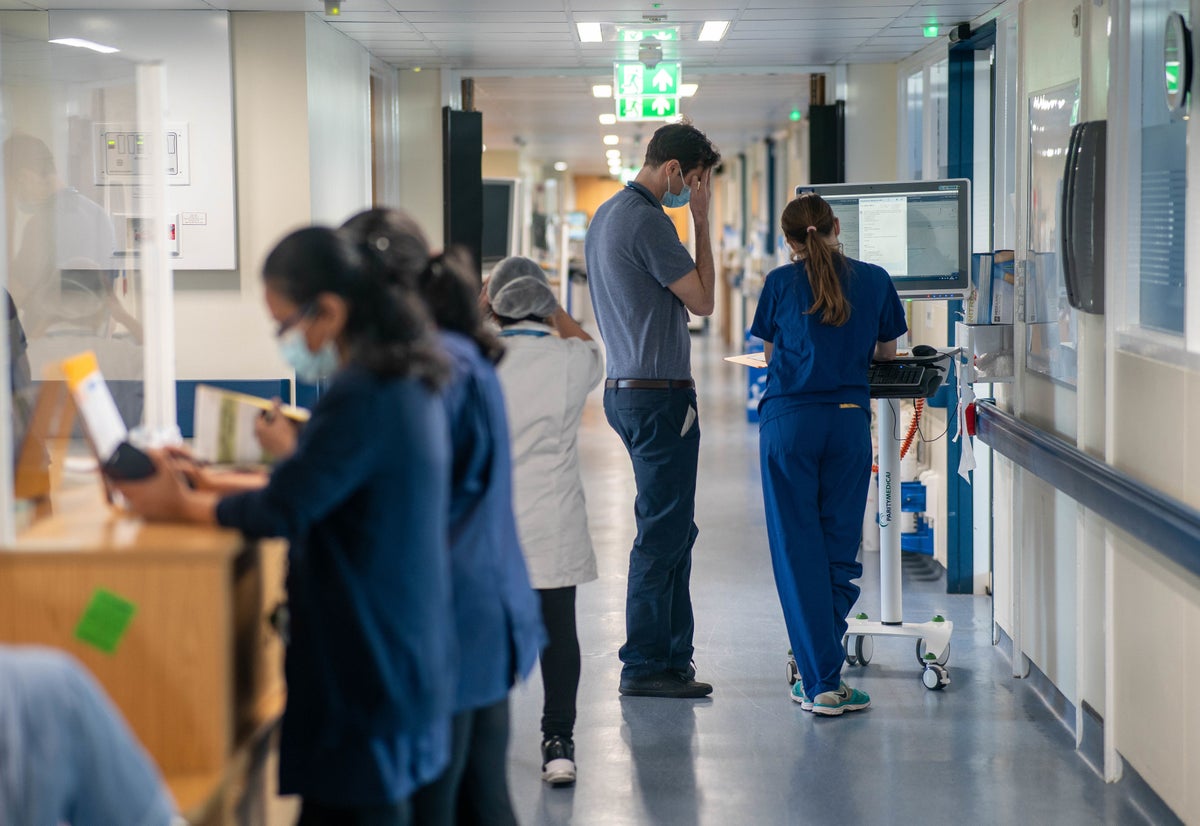
Suicidal NHS staff will be left in “dangerous” situations without support when national funding for mental health hubs ends next month, health leaders have warned.
The hubs, set up with £15 million of government funding for NHS workers following Covid, are being forced to close or reduce services as neither the department for health and social care nor the NHS has confirmed ongoing funding for 2023-24.
This will leave thousands of NHS staff, some of whom are described as “suicidal” in “complete limbo”, The Independent has been told.
The British Psychological Society (BPS) and the Association of Clinical Psychologists said the failure to continue the funding was an “irresponsible” way to treat vulnerable health and care workers.
It comes after The Independent revealed that the number of sick days taken by NHS staff almost doubled in 2022 compared to before the pandemic, costing the NHS billions.
If you have been impacted by this story email rebecca.thomas@independent.co.uk
Professor Mike Wang, chair of ACP, said: “There is a clinical responsibility, not to remove a service from individuals who are vulnerable, and in difficulty … the problem with that is that the funding ceases at the end of March and that’s absolutely no time at all to make any [future] provision. So, it’s clinically irresponsible to simply halt a service. Some of these individuals are, you know, carrying suicide risk.”
He said it was “dangerous” and “astonishing” that funding for the hubs was ending “given the present circumstances of continuing effects of the pandemic, clear evidence of underfunding of health care in this country”.
Professor Tony Lavender, workforce and training lead for clinical psychology at BPS, said: “The timing of this couldn’t really be worse. It must be self-evident to people that the NHS is in difficulty. Just look at the difficulty retaining staff, recruiting staff, this kind of sickness levels, the general morale.”
“It is almost unbelievable to withdraw a service that’s about improving and helping the well-being of staff for which there’s evidence for effectiveness.”
The BPS and ACP are calling for the government to commit to at least an additional year’s funding for the hubs so transitional arrangements can be made.
“Devastating”
Jane Borland, a care home manager from Northamptonshire, who was referred to the hubs in 2021, said the news about the hubs ending had left her “angry” adding “it is really devastating”.
She said that with waits of up to 18 months for mental health services, many colleagues were left thinking “what is the point, I need the help now not a year from now”.
Ms Borland, who worked during the pandemic, said: “We were left with no support at all … there were some scenes that we witnessed that you know, you never ever wanted to want to see again.”
“I didn’t really appreciate what was going on, I don’t usually suffer with my mental health. Normally whatever life throws at me I deal with.”
She explained, “I was very angry, really angry, quite tearful as we were sort of coming out from Covid I found myself really, really tense so I could see that I wasn’t coping very well…without [the hub] I don’t think I’d be here [at work].”
She said the hub provided her with a group and “a safe space” to talk about what she’d been through during Covid.
“It really helped me get to the person or my personality was as I was. It’s been incredible,” Ms Borland added.
“Complete limbo”
Data for 11 of the 40 mental health hubs shows that 2,800 staff currently being treated will be left with no services beyond March.
Most of these hubs have seen a significant increase in demand from October 2021 to 2022 with an average rise of 72 per cent.
One evaluation seen by The Independent, showed 52 per cent of healthcare workers referred said their mental health had definitely been affected by work.
At least 74 per cent were absent from work or considering taking sick leave, while 81 per cent said they would remain or return to work after receiving care.
According to BPS and ACP, “hub teams are desperately trying to identify alternative funding arrangements to secure the services’ future. Some hubs have been forced to wind up their services, with staff potentially facing redundancy or redeployment. One hub has already served redundancy notices to staff”.
One hub leader told The Independent that patients would be left in “complete limbo”, adding that “is no way to run a clinical service it’s just not responsible … people [the hub leads] are very disturbed by the situation”.
She explained that the staff referred to the hub would be left only with local mental health services, for which they faced “enormous waiting times”.
She said research and evidence suggest that healthcare workers required a very specific form of service, different to what is available on the NHS such as talking therapies.
She added: “Staff stopped knowing that they need to rest, they need a break. It’s quite a worrying thing to encounter and It’s widespread. It has an enormous impact staff’s ability to look after patients with empathy and this is terrible for staff as well as patients.”
“[There is] a powerful link between the condition staff is in and how well they’re looked after and how they can care for patients.”
An NHS spokesperson said: “The staff mental health and wellbeing hubs were set up in October 2020 in response to the pandemic, using additional non-recurrent funding until the end of this year. A final decision is yet to be made on the funding of these hubs for 2023/24.”







